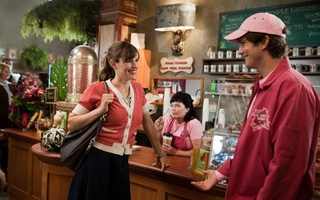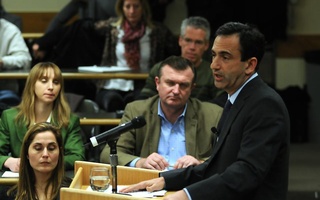
Baroness Catherine Ashton spoke about foreign affairs and the European Union yesterday at the Sackler Museum. Her speech, "The European Union Facing Global Challenges," was the 19th annual Paul-Henri Spaak lecture presented by the Weatherhead Center for International Affairs. Baroness Ashton serves as High Representative for Foreign Affairs and Security Policy of the European Union.
Baroness Catherine Ashton discussed the future of the European Union’s foreign policy in light of international economic, political, and environmental challenges before a full auditorium at the Arthur M. Sackler Museum last night.
“The future of Europe depends on the security and sustainability that we are able to create in the rest of the world,” said Ashton, the EU high representative for foreign affairs and security policy. “The problems that we face are global, and if we are going to find solutions to these problems, we need to be a cohesive unit able to work together in partnership.”
Ashton—whose position is often likened to being the foreign minister of the EU—said that she believes the EU should confront these issues through conflict prevention, climate change security, crisis management, and humanitarian aid, both within Europe and abroad.
In particular, she noted that the EU played a key role in providing humanitarian aid to Haiti earlier this year and said she believes the European community will have a pivotal role in encouraging dialogue in Serbia and Kosovo to bring about a compromise in the region.
In an interview after her speech, Ashton said that “bringing together resources is a significant part of what I think Europe should be doing,” referring to both improving crisis management and pooling developmental aid.
Ashton said that economic sustainability—building strong economic links—for the people in Europe comes in large part from the strength of the relationship with other countries.
To date, 16 European countries have adopted the Euro, which has been one of the region’s biggest economic challenges, according to Ashton. The Euro is “a currency tested in the fire of the economic crisis, particularly what has happened in Greece,” she said.
Patrick J. Leonard ’14—who also attended a breakfast with Ashton yesterday morning—said that he was previously unaware of Ashton’s role within the European Union, but that she was adept at explaining the concept of European integration to Americans.
“In order for the EU to achieve its objectives, it is important that citizens of foreign nations understand its promise,” he said.
“I think the European Union was more an American dream than it was a European dream,” Ashton said, pointing to the post-war chaos in Europe and the desire for lasting peace.
Since its creation, the EU has mediated revolutions in former communist countries and notably, these countries did not go through “the pendulum swing to another fall of authoritarian regime, but instead, opted for the European institutions. They joined a common cause: democracy, economic prosperity, and rule of law,” she said.
Europe is finally growing together, she said, as evidenced by the coordinated EU walk-out at the remarks of Iranian President Mahmoud Ahmadinejad about 9/11 at the UN General Assembly last week.
Read more in News
Studying Gaga, Beyoncé Up CloseRecommended Articles
-
Ex-Foreign Minister Of Austria Joins IOPFormer Foreign Minister of Austria Ursula Plassnik will join the Institute of Politics as a visiting fellow this week.
-
 Valentine's Day
Valentine's Day -
 Gordon Discusses Eastern European Integration
Gordon Discusses Eastern European Integration -
Fixing the EurozoneThe optimal economic solution would be a fully integrated fiscal system in which a central European government made decisions in a structure similar to the U.S.
-
 European Official Looks at Solutions For Crisis
European Official Looks at Solutions For Crisis -
Diplomat Analyzes E.U. Foreign PolicyIncreasing coordination between European Union member states and other countries will create a stronger future for the EU, said Richard.













